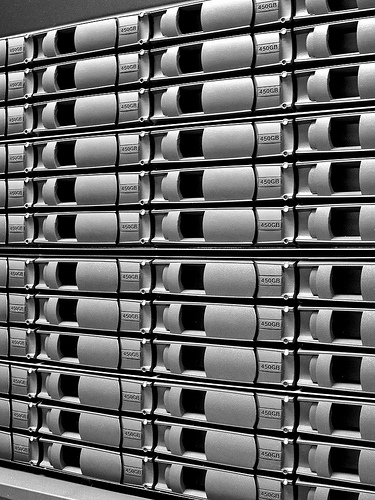Cloud Storage vs. Traditional Hard Drive vs. Flash Storage
Comparing traditional HDD servers, flash storage (SSDs) and the cloud is a little like comparing apples to oranges to the Jetsons’ food pills. They all accomplish the same thing, but they’re vastly different in their approach.
Traditional HDD Servers
These tend to not last quite as long as flash storage and are prone to crashing comparably. Their cost is quite manageable, but it doesn’t take into account that they’ll need to be replaced more often. It also doesn’t take into account your cooling bill. Since HDDs need to physically spin to write/read, they produce a sizeable amount of heat. If you have just one or two, it shouldn’t have much of an effect. But lump a group of them together, and you’re going to have to shell out some more money to keep your server room cool.
Other ‘hidden’ costs for HDDs lurk in the form of additional IT personnel. You’ll most likely need the same amount as you would with SSD servers, but more than you would with cloud servers.
SSD Servers
Solid state drives have been gaining popularity ever since they appeared in the 2008 MacBook Air. They were originally cost-prohibitive, but prices have been falling since new manufacturing techniques have been developed. They’re still around 20 times more expensive than HDDs, but they do have their benefits.
SSDs work by using small electrical charges to “flip” switches in memory cells. There are no moving parts, which means that crashes are impossible. Not just unlikely—impossible. That isn’t to say that it will live forever, though. Each cell can be written on a finite amount of times. That number, however, is incredibly large and promises that your SSD servers would far outlive your HDDs. You will still need IT staff to update your solid state drive servers and perform maintenance.
Cloud Computing
It’s hard to talk about cloud computing without first acknowledging what it is. Cloud computing basically refers to outsourcing your computing power to datacenters and accessing these rented servers through the Internet. That means that the difference between using them and using your own servers is the difference between buying and renting a home. Except, of course, that in this case the home will wear out within a decade at the most, and will need to be replaced.
Renting a server from a hosting company means you’ll need less IT staff, because they’ll perform and necessary updates and keep things running smoothly. You also won’t have to worry about procuring your own backup solution. Cloud vendors take care of that.
Cloud storage is definitely a viable option to replace other types of storage, including hard disks and flash. Especially when considering other perks like super fast speeds, lack of maintenance, and the security of knowing the data is safe, it becomes an even more attractive choice.
Prices right now vary by vendor, but, considering all that they include, aren’t unreasonable. The important thing to remember when looking into cloud hosting is that, like your other vendors, not all of them are created equal. Find a service that matches your needs for a fair price and you’ll be happy. If you just get the cheapest company you can Google, be prepared for data loss and server downtime.
Choosing the right storage solution for your business
Each storage method has upsides and downsides. If you’re a small business just looking to store a few documents each week, you may want a traditional HDD server. Larger offices that will need to access records frequently and quickly should consider the cloud. Evaluate all of your options and talk it over with your IT department, since they’re the ones who know your computing needs best. Evaluate all your options and talk it over with your IT department or information security expert, since they’re the ones who know your computing needs best.

